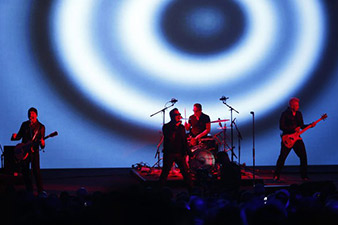
10/09/2014 12:24
With ‘Songs of Innocence,’ U2 Recasts Its Youth
Memories are a blast on “Songs of Innocence,” the album that U2 released on Tuesday afternoon as a worldwide giveaway. With a title that echoes William Blake, the album is a blast of discoveries, hopes, losses, fears and newfound resolve in lyrics that are openly autobiographical. It’s also a blast of unapologetic arena rock and cathedral-scale production, equally gigantic and detailed, in the music that carries them.
The immediate news was that “Songs of Innocence” (Interscope) can be downloaded free until Oct. 13 by everyone with an iTunes Store account: half a billion people in 119 countries. (Physical and digital versions of the album go on sale Oct. 14.) The giveaway is a dream scenario for U2, a band that has always wanted everyone to feel its choruses and sing along. Apple has made distribution the easy part; the bigger challenge for U2 is to make people care about a new statement from a familiar band.
During its five years between albums, U2, which released its first recording in 1979, publicly pondered how to stay relevant. Its solution, on “Songs of Innocence,” is to reimagine its young, retrospectively innocent selves and recall what fired them up: family, neighbors, lovers, street action and of course, music. Liner notes by Bono, the band’s lead singer and main lyricist, fill in many of the back stories, describing the songs as “first journeys.”
There are tributes to Joey Ramone, whose example showed Bono how to sing melodically but feel punk, and to Joe Strummer of the Clash, whose social consciousness inspired U2. In other songs, traumas are as significant as joys. “Songs of Innocence” includes “Raised By Wolves,” about a terrorist car bombing in Dublin in 1974 and its aftermath; “Sleep Like a Baby Tonight,” a prettily sinister depiction of a pedophile priest; and a nostalgia-defying song about “Cedarwood Road,” the Dublin street where Bono grew up. In the song he calls it “a war zone in my teens.”
The music on “Songs of Innocence” doesn’t hark back to the open spaces of early U2; it exults in multitrack possibilities. But it connects emotionally to a time when, as Bono sings in “The Miracle (of Joey Ramone),” “I wanted to be the melody/Above the noise, above the hurt/I was young/Not dumb.”
As U2 worked on the album, producers came and went, including some now-vanished flirtations with dance-music hitmakers and the back-to-basics guru Rick Rubin. Of U2’s longtime production brain trust — Brian Eno, Daniel Lanois, Steve Lillywhite, Flood — only Flood has a few credits on “Songs of Innocence.” Instead, the album credits Danger Mouse (Gnarls Barkley, Broken Bells) as overall producer, with frequent collaborations from Paul Epworth (Adele) and Ryan Tedder (OneRepublic). And U2 sticks decisively to rock.
Clearly determined to compete for radio play with the many younger rockers who studiously emulate U2, most of the album puts a higher gloss, and sometimes a heavier fuzz tone, on the band’s instantly recognizable sound. The music is still defined by Bono’s buttonholing vocals, the Edge’s echoing guitars, Adam Clayton’s brawny bass lines and the steadfast march beats of Larry Mullen Jr. on drums. But there’s a newly eruptive sense of dynamics in these tracks; when the band assembles a celestial vocal choir or a gorgeous swirl of guitars and keyboards, a pummel or a distorted roar is rarely far behind.
U2 also makes clear its sense of history. The first verse of the Joe Strummer tribute, “This Is Where You Can Reach Me Now,” looks back to the Rolling Stones’ “Gimme Shelter” before switching to a Clash beat. An homage to the Beach Boys — a chorale of vocal harmonies and then a surf-tinged beat — runs through “California (There Is No End to Love),” a song about U2’s first visit to Los Angeles and broader thoughts. “There’s no end to grief,” Bono sings. “That’s how I know/And why I need to know there is no end to love.”
The songs ground philosophical musings and high-flown imagery in concrete reminiscences and events. “The star that gives us light has been gone a while/But it’s not an illusion,” Bono declares in “Iris (Hold Me Close),” which memorializes Bono’s mother, Iris Hewson, who died in 1974. It has the album’s most poignant chorus: “Hold me close,” he sings, “I’ve got your light inside of me.”
Conscious of mortality and tied to personal stories, most of U2’s new songs don’t sell themselves to teenagers like the generalized pop anthems of current U2 imitators (including Mr. Tedder’s OneRepublic) or, for that matter, the 1980s U2 that came up with songs like “I Still Haven’t Found What I’m Looking For.” Even the album’s two most direct songs about romance, with sturdy melodies and straightforward buildups — “Song for Someone,” about meeting a soul mate, and “Every Breaking Wave,” about a looming breakup — are tinged with misgivings and ambivalences. U2 can’t return to innocence, and knows it.
The album’s closing song, “The Troubles,” moves abruptly away from glimpses of volatile youthful aspirations to envision lingering adult disillusion. The arrangement moves U2 considerably closer to Danger Mouse’s songs with Broken Bells. Over minor chords backed by a string section, a guest vocal by the Swedish pop singer Lykke Li warns, “Somebody stepped inside your soul,” and Bono follows up: “You think it’s easier to put your finger on the trouble/When the trouble is you.” It’s a dark postscript, a reminder that growing up doesn’t resolve youth’s contradictions; it brings sorrows of its own.








